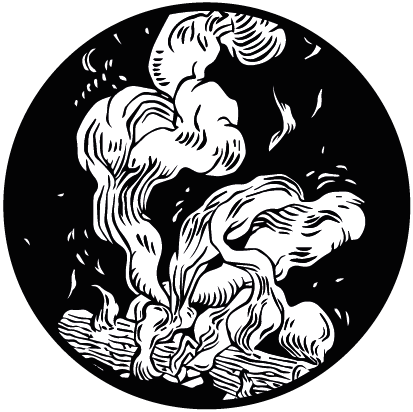
Zimme de braxa
Zimme de braxa (“sparks of embers”) is a book series born in collaboration with the publisher Zona, edited by Anselmo Roveda and under the auspices of the Council for Ligurian Linguistic Heritage (Conseggio pe-o patrimònio linguistico ligure). It aims to offer an overview of the vast spectrum of Ligurian literature from medieval times to the present day, spanning a variety of textual genres, themes and linguistic areas.
The volumes it features – all accompanied by critical notes and commentary – are variously texts from the historical literary tradition, reissues of some of the most significant works of the last two centuries, and unpublished works by contemporary authors. The series is divided into three sections, each relating to a textual type and distinguished by a color accent on the cover: red for poetry and rhyme; green for fiction and prose; and blue for theater and drama.
The series is edited by Anselmo Roveda and is supported by Stefano Lusito, Jean Maillard and other specialists. The logo and artwork are by illustrator and graphic designer Elettra Deganello.
Volumes
1. Ro mêgo per força
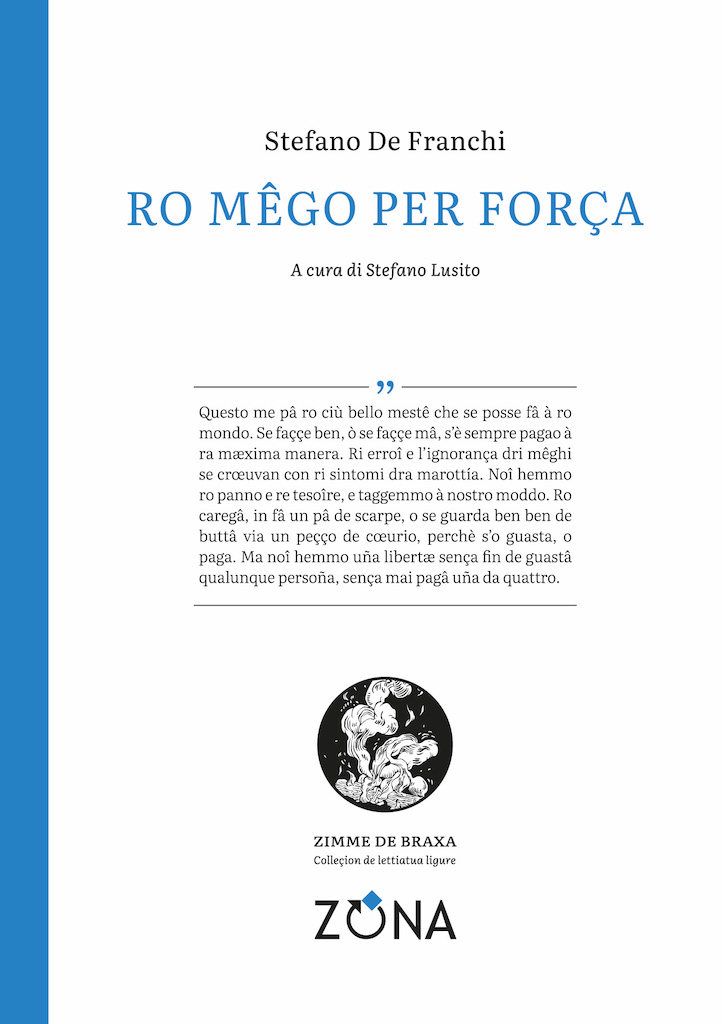
Ro mêgo per força – a version of Molière’s famous Le médecin malgré lui – is one of the best examples of a transposition of a widely circulated play into Genoese. De Franchi’s theatrical production gives readers a vivid depiction of 18th-century Genoa. The volume includes an introduction and a glossary of lemmas and expressions which may be less intelligible to today’s readers.
Stefano De Franchi (1714–1785) is the leading exponent of 18th-century Genoese literature. He participated in the War of Liberation of 1746–47 and was a member of the Ligurian Arcadian colony. He was the author, with others, of the semi-facetious remake of Tasso’s masterpiece (Ra Gerusalemme deliverâ, 1755); late in life he gave to the presses an anthology collection of his own poems (Ro chittarrin, ò sæ, strofoggi dra muza, 1772) and a series of comedies in two volumes (1772; 1781), largely mediated from French theater.
 purchase the book
purchase the book
2. Föe moderne
illustrated by Elettra Deganello
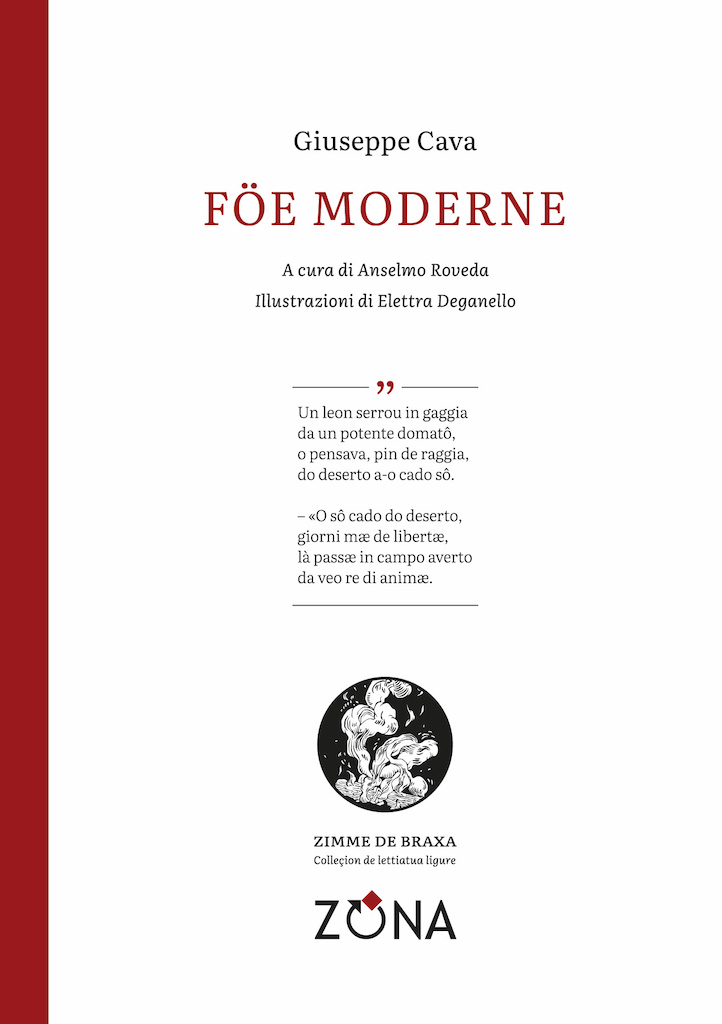
Föe moderne collects the “modern fables” published by Giuseppe Cava in the fourth section of his poetic collection Into remoin (1930). They are rhyming texts that are part of the literary tradition of fable-making initiated by Aesop and Phaedrus, in Liguria embodied in the 19th century by Martin Piaggio. For the author, a member of the anarchist and socialist movements, fables are opportunities for social criticism. This volume includes an essay on fables and a glossary of the lemmas and expressions contained in the texts.
Giuseppe Cava (1870-1940) was a writer and poet from Savona. He was amongst the most important exponents of Ligurian literature in that city. He had a large body of work that was published in periodicals – after his debut with A strenna de Savoña (1923), he published the collection Into remoin (1930), which also includes his modern fables.
 purchase the book
purchase the book
3. Ei fóe dei ferguò
featuring essays by Stefano Lusito and Anselmo Roveda
illustrated by Elettra Deganello
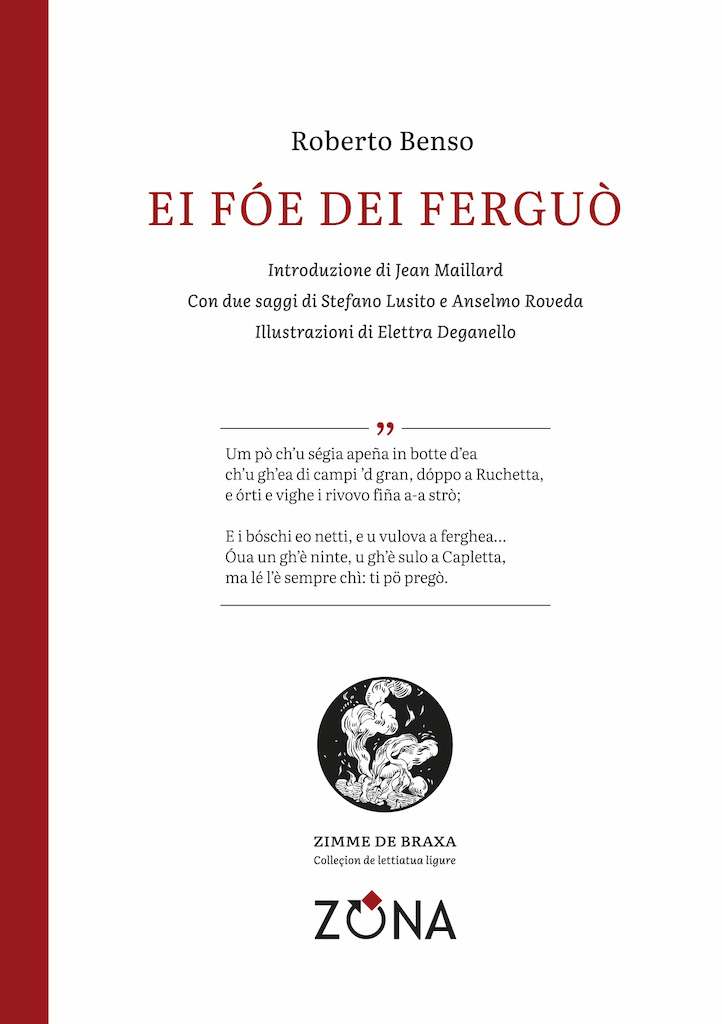
Ei fóe dei ferguò collects the poetic production of Roberto Benso written in the dialect of Carrosio, a town between Voltaggio and Gavi, in the province of Alessandria. The author’s life and reflections reverberate in these poems. It is an extremely important linguistic document, hitherto the only evidence of an almost undocumented Ligurian variety. The volume is accompanied by two essays: one on the characteristics of the dialect of Carrosio, the other on Ligurian literature in the historical region of Oltregiogo.
Roberto Benso (1939) is a writer, born in Carrosio and graduated from the University of Genoa. He is the author of numerous monographs, essays, scholarly articles, and catalogs. He was the former editor of the periodical In Novitate, published by the Centro Studi di Novi Ligure of which he is currently honorary president.
 purchase the book
purchase the book
4. Fî
featuring an essay by Anselmo Roveda
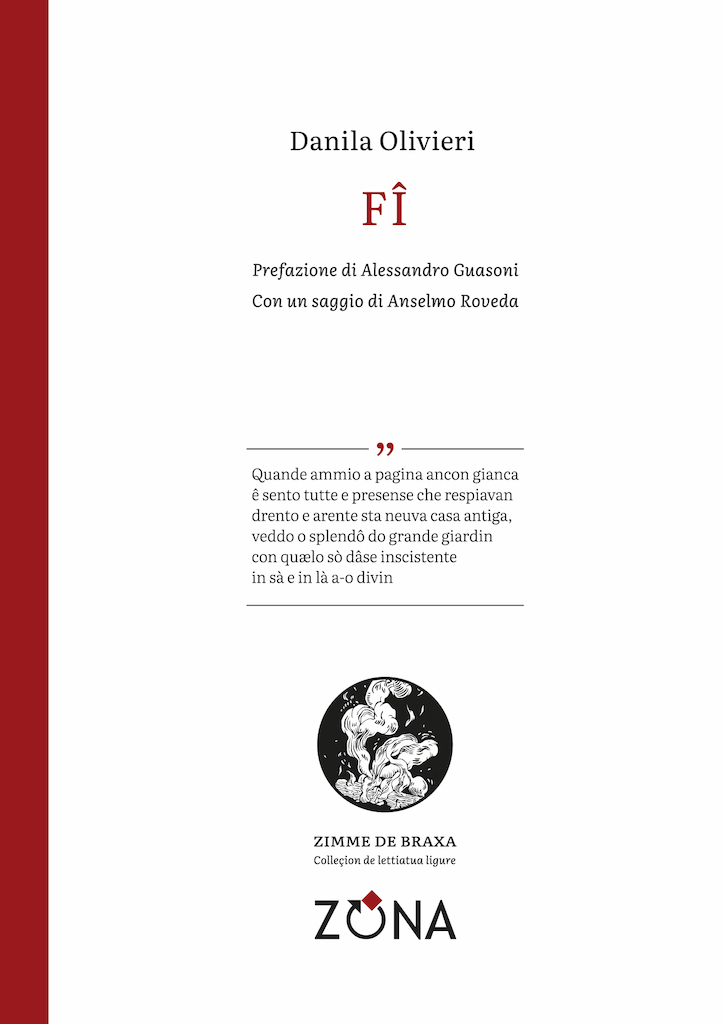
In the poetry of Danila Olivieri, as Alessandro Guasoni writes in the foreword, much is “entrusted to the sound of the word, to the play of assonances and alliterations, which make it largely untranslatable, just as untranslatable in human language is the voice of the waves, of the wind in the trees, of nature. A meditation on death, as is proper to every poem, Danila Olivieri’s reflection leads us to the threshold of mystery, to a pantheistic-like conception of life, similar to Firpo’s, with his faith if not in rebirth, at least in some immortality”. The now invisible presences of the ancient house, evoked in her poetry “have moved among the infinite possibilities of the blank page, endowed therefore with their own immortality, and ready to reappear in the play of life”.
Danila Olivieri (1955) of Riva Trigoso, is president of the “Pen(n)isola-San Marco” Literary Salon in Sestri Levante and a jury member of the Carlo Bo/Giovanni Descalzo International Prize. For poetry in Ligurian, she has received several awards: several times a winner of the O Leudo Prize, she was awarded the XXXVI Lauro d’Oro prize of the Consulta Ligure and the special “Dedo Sanguineti” prize at the Ciävai competition. In the series of “Ciottoli”, cultural notebooks related to the territory of Trigoso, she published two sylloges containing poems in Genoese and Italian: Stella cometa à Tregosa (2004) and Dritto e Reverso (2010). In Italian she has published six poetry collections, the most recent being Ali di tenerezza (Puntoacapo, 2021), and the short stories in L’ultima luce (Panesi, 2022).
 purchase the book
purchase the book
 Read the essay on poetry in the Tigullio region
Read the essay on poetry in the Tigullio region
5. Zena. Rivista trimestrale (1958-1959)
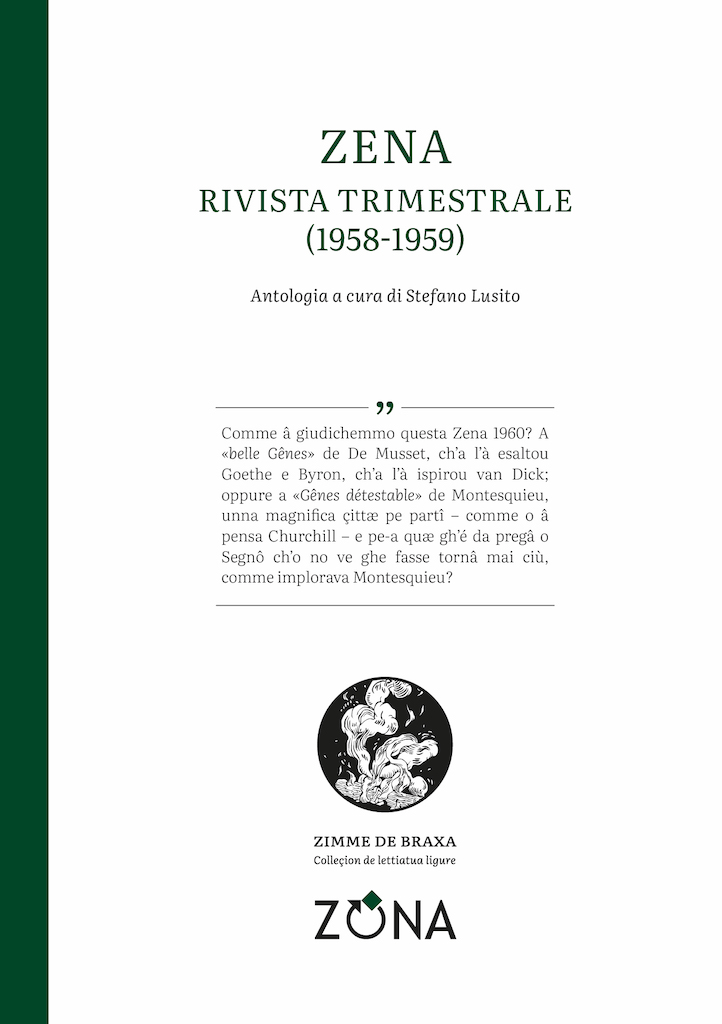
After the first decades of the 20th century, journalistic activity in Genoese headed toward gradual stagnation – a trend to which the short experiment of “Zena”, a quarterly periodical edited by Ettore Balbi between 1958 and 1959, was an exception. The magazine’s texts offer a particularly realistic cross-section of Genoese and Ligurian society in the period of the economic boom. Mirroring the trends of those years is also the linguistic form in which the magazines’s texts are written, by then heavily reliant on Italian. This volume brings together an anthology of the magazines’s most significant articles, editorials and content, contextualized in the historical and social period in which they were conceived.
 purchase the book
purchase the book
6. Nuvie reusa a-o tramonto / Giacomiña
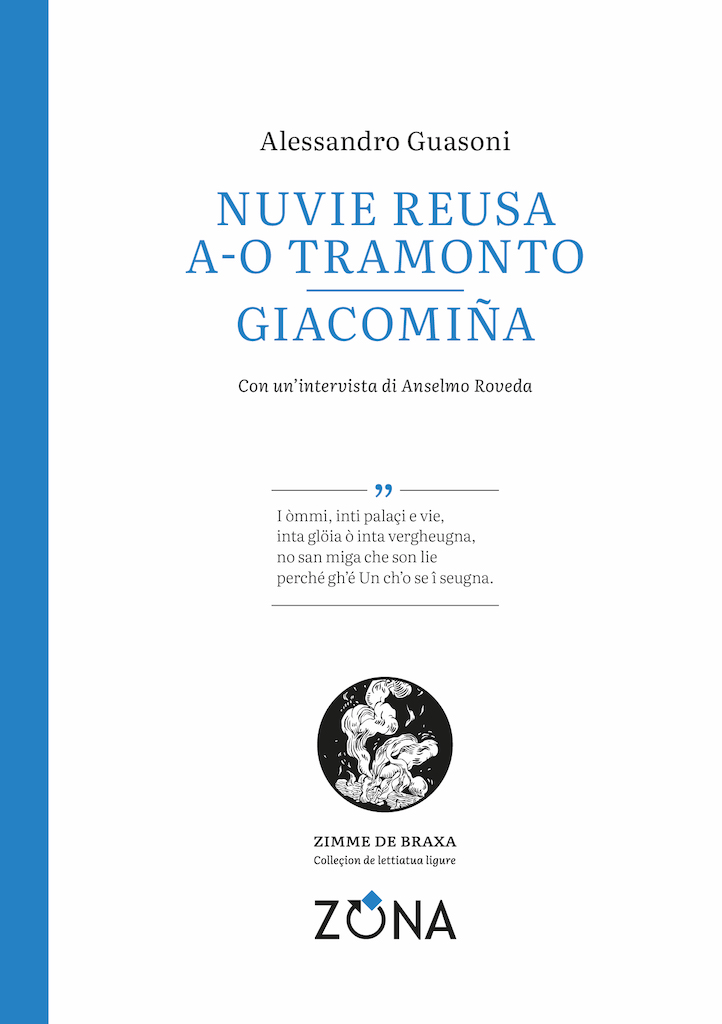
The cumbersome presence of Govi and his theater has strongly conditioned the development of new experiences on the 20th-century Genoese scene. The current crisis of the theatrical genre, even in Italian, has further aggravated the situation, and the various attempts to resolve it have gone almost unnoticed. In these plays – the first dating back to 1983, the second to 1995 – Guasoni has tried to react by ploughing different paths. While Captain Perasso’s drama vaguely refers to certain minor and “supernatural” texts by O’Neill, Giacomina’s “philosophical farce”, poised between epic theater, vaudeville, fairy tale and satire, is a nod to the experimental theater in vogue at the time.
Alessandro Guasoni (1958) from Genova-Voltri, has been writing poems, short stories, plays and essays in genoese since 1973. He has contributed to several magazines, with poems and essays on Italian regional literature. Between 1995 and 1998 he reviewed the theater season in Genoese in “Liguria” by publisher Sabatelli. In 2010, in collaboration with Fiorenzo Toso, he published the grammar Il genovese in tasca (Assimil, Chivasso). Beetween 2015 and 2020 for he edited the literary criticism column in Genoese “Voxe de Liguria” for the Ligurian newspaper “Il Secolo XIX”. He his a contract collaborator with the University of Innsbruck for the Genoese phraseological vocabulary GEPHRAS. On behalf of the Council for Ligurian Linguistic Heritage he is publishing on the web an An anthology of Ligurian literature from its origins to the present day. New volumes of poetry and short fiction are in preparation.
 purchase the book
purchase the book
 Read the interview with the author
Read the interview with the author
7. Abrexê do çê
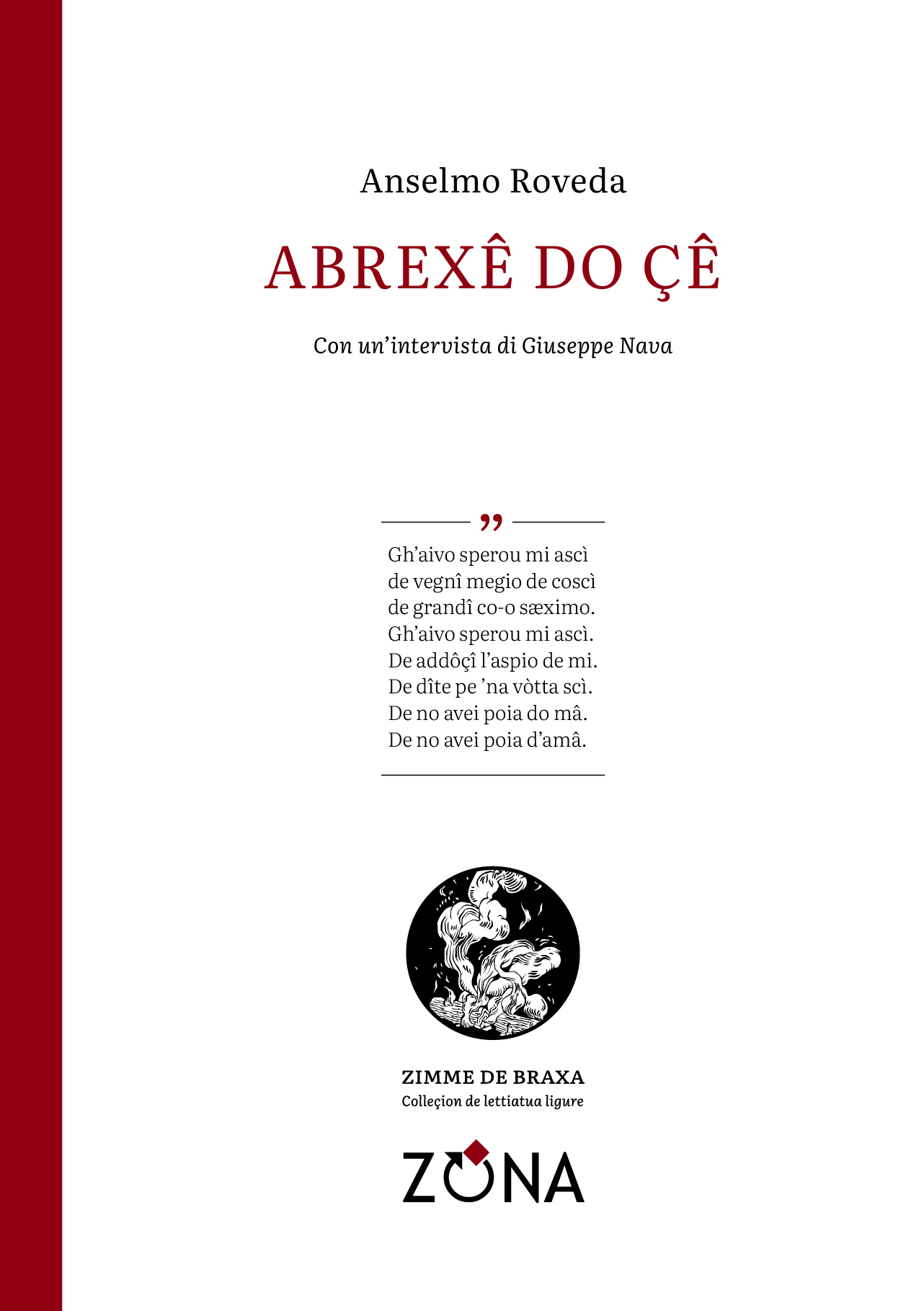
Roveda’s third poetry collection in Genoese offers, for the most part, texts written after the spring of 2016. The main series, which gives the volume its title, is a kind of “compendium of the sky”, poems composed looking upwards and inwards, on the road and in Genoa. These are joined by sketches and notes in free verse that the author jots down in the notebooks of his frequent travels imposed by his literary and teaching activities. In an ideal horizon in which Genoese becomes both an intimate language – of almost diaristic reflection – and the language of the world, useful for describing and recomposing the different landscapes and situations encountered. As recently noted by Alessandro Guasoni, “very often Roveda, with his lyrics, immerses himself in a sunny Mediterranean world – where even a Genoese could find himself – with the hope of giving new life to our traditions by leaning on those of peoples who are related to us, an operation already attempted in their own way by Giuliano Balestreri and De André. A trip to Galicia rather than to Rome or Tokyo, a remembrance of Amalia Rodrigues, a quotation from Buttitta are all found on this psychological and literary itinerary, while the topical poems again fall within that tradition of civic engagement, which is typical of literature in Genoese”.
Anselmo Roveda (1972), born in Genoa and raised between Arenzano and the upper Orba valley, is professor of Screenplay II (Analysis of narrative structures and elements of creative writing) at ISIA Urbino. He is a writer – in Italian and Genoese –, a scholar of literature, folk traditions and imagery, deputy editor of the “Andersen” magazine and director of the literary review “Cabirda”. Some of his works have won awards and have been translated abroad. In Genoese he has published the collections of poetry A farta d’euio de framboase into sangue spantegou (2006) and Rafataggi (2016); the short story O cadaveo do Reixa (2016), serialized in “Il Secolo XIX” and the children’s books O pigheuggio e a pruxa (2015), A donnetta ch’a l’anava a-a fea (2016), E ciù belle föe. Dozze stöie di Fræ Grimm (edited and co-authored with A. Acquarone, 2019) and Moen (2023).
 purchase the book
purchase the book
8. Penscëi mai diti
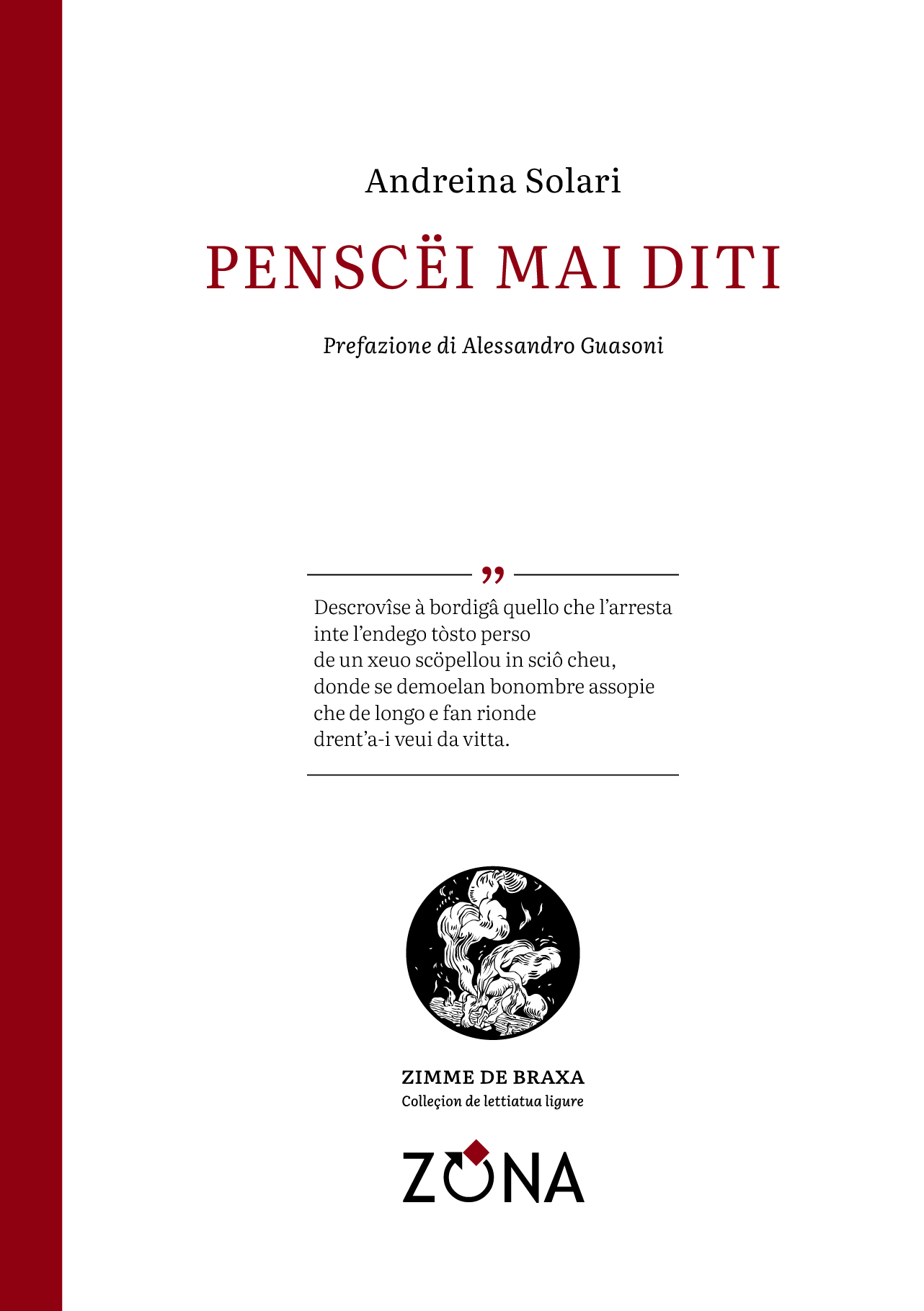
Andreina Solari’s poems, carved from their author’s soul, “resemble the arduous paths in the streets of the Ligurian hinterland”, writes Alessandro Guasoni in the introduction. Surprising paths, of unusual beauty, complex to tackle. In Solari’s case, complexity is given in the thoughtful literary work embodied in the choice of words, often archaic, in the formation of syntagmas, often unusual, in the juxtapositions of images. The author, for this second poetic collection of hers – after her debut with Poule sccette (2016) – draws inspiration most often from memories and moods related to the past, which provoke reflections and meditations on being and human destiny. An invitation to walk the paths of memory, a memory that is private and universal at the same time. Poems written in a rough and stony language – the reference to Montale at the start of one of these texts cannot be accidental – where the concept of “male di vivere” is taken up; a language therefore absolutely consonant with the landscape, also interior, which is described.
Andreina Solari (1956), born in Chiavari, has been a councilor at the municipality of Leivi with responsibility for schools and culture, as well as promoter and president of the National Poetry Prize in Italian and Genoese established in that town. She has been active in cultural associations and the organization of literary events. For several years she has devoted herself to the study of the Genoese language, with particular attention to the reclamation of disused words. She collaborates with the Sunday page Parlo ciæo of the newspaper “Il Secolo XIX”. For her literary activity she has received numerous awards in national prizes and competitions.
 purchase the book
purchase the book
9. Gh’é o vento ch’o mescia
illustrated by Alessandra Albarello
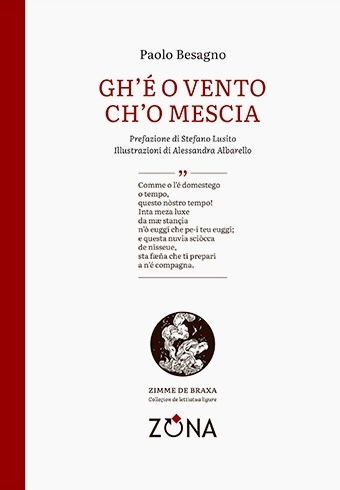
Inserting himself in that “high” strand that has characterized the literary use of Genoese since its origins, in this volume Paolo Besagno organizes and presents for the first time a series of texts (in verse or poetic prose) of a strongly introspective nature, aimed at times at retracing personal events from an autobiographical perspective, and at times at reflections on particularly topical subjects, such as racism or the fear of what is different. Constantly contending between a style that is rough and delicate, anxiogenic and sunny, the author’s language proves as versatile as his own voice.
Paolo Besagno (1964), born in Genova, has been a composer, instrumentalist and author of musical pieces in Genoese since his youth. Since 1993 he has been a member of the folk singing group “I Giovani Canterini di Sant’Olcese”, of which he is now spokesman and artistic director. The use of Genoese characterizes all of his production, which ranges from electronic music to trallalero, passing through songwriting and more markedly literary texts.
 purchase the book
purchase the book
 the preface
the preface
10. Conti curti
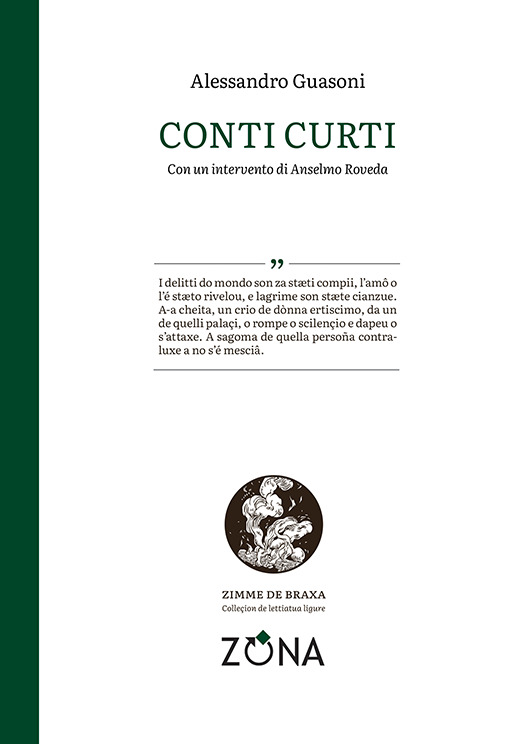
These seventy-four short stories by Alessandro Guasoni capture sensations, moments, and reflections, transposing them into often dreamlike and evocative watercolors. The author’s prose – as is already known to those who have become familiar with him during his fifty years of literary activity in the Genoese language – is characterized by a particular formal exploration, with frequent use of terms or syntactic constructions that aim to emphasize the typological difference between Genoese and Italian. For this reason too, Guasoni’s texts represent an excellent resource for those who want to improve their knowledge of Genoese, and are proposed as a possible “model” for modern literary prose in Genoese.
Alessandro Guasoni (1958) from Genova-Voltri, has been writing poems, short stories, plays and essays in genoese since 1973. He has contributed to several magazines, with poems and essays on Italian regional literature. Between 1995 and 1998 he reviewed the theater season in Genoese in “Liguria” by publisher Sabatelli. In 2010, in collaboration with Fiorenzo Toso, he published the grammar Il genovese in tasca (Assimil, Chivasso). Beetween 2015 and 2020 for he edited the literary criticism column in Genoese “Voxe de Liguria” for the Ligurian newspaper “Il Secolo XIX”. He his a contract collaborator with the University of Innsbruck for the Genoese phraseological vocabulary GEPHRAS. On behalf of the Council for Ligurian Linguistic Heritage he is publishing on the web an An anthology of Ligurian literature from its origins to the present day. New volumes of poetry and short fiction are in preparation.
 purchase the book
purchase the book
11. A stissa ch’a ciòcca into veuo. Poexie 1969-1990
featuring a linguistic note by Stefano Lusito
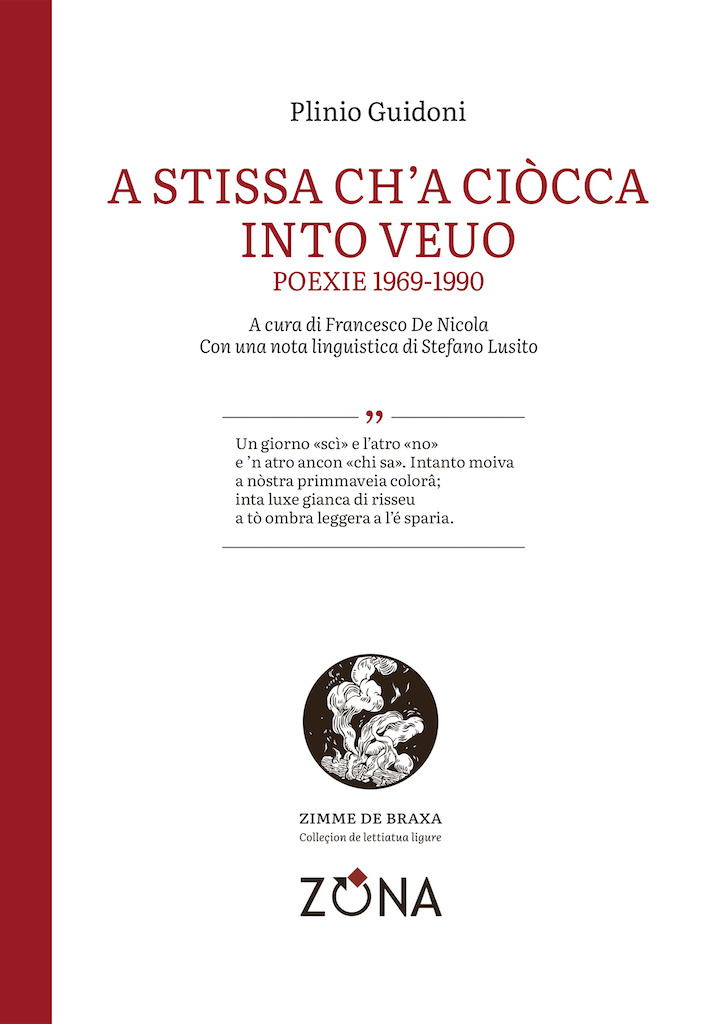
In his works in Genoese, Plinio Guidoni followed his own original path and, although influenced by previous linguistic models, he distanced himself from the popular thematic component, bordering on the folkloristic, that had come to characterize part of 20th century poetry in Genoese.
In his verses, the author addresses the central topics of our time, so much so that his poems still appear highly relevant today: from the destruction of nature resulting from the industrialization of suburban areas to the arid city life, from man’s destiny marked by the path of fate to the indissoluble bond with one’s roots.
This volume fully reproduces the poet’s four poetry books, enriched by an essay on Guidoni’s artistic journey written by Francesco De Nicola, editor of this re-edition, and by a linguistic note by Stefano Lusito.
Born in Camogli, at the age of ten Plinio Guidoni (1922-1994) moved to Genoa, where he attended high school and university. In 1944 he was captured and deported to Germany. He was only able to return to his homeland the following year. His job in a bank meant he moved around a lot (to Serravalle, Florence, Turin, Asti and Rome). Thanks in part to the acquaintance he had made in Rome with Mario Dell’Arco – who in 1952 had published with Pasolini the first anthology of 20th century dialectal poetry – he turned to Genoese as a literary language for his four volumes of poetry, which are reprinted in this collection: A çittæ deserta (1969), L’ostaia (1978), Sette corali (1982) and Controvento (1990).
 acquistare il volume
acquistare il volume
12. Sotta à chi tocca!
Canzoni e letteratura della resistenza in Liguria
featuring contributions by Rita Bruzzone and Walter Fochesato
three illustrations by Marco Paci and two audio tracks di Paolo Besagno
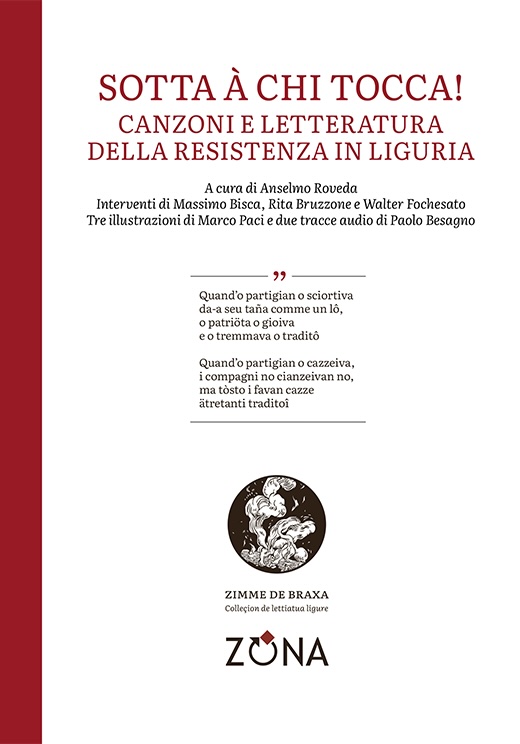
Sotta à chi tocca, Emmo vinto ’na battaggia, O vintiquattro d’arvî… An anthology of partisan and anti-fascist songs born and spread in Liguria during the Resistance, sometimes adapting texts or melodies from the Risorgimento or even from revolts against the Austro-Piedmontese occupation of the mid-eighteenth century, presented with variants, period documents, sound sources, and historical annotations.
This Resistance songbook is accompanied by a survey, with a selection of literary texts - poetry, fiction, theater, and memoirs - written in the Ligurian language and inspired by the experience of the War of Liberation or referring to the dark years of the Second World War: from Edoardo Firpo to contemporary authors, including Alfredo Gismondi, Rita Cuneo Narizzano Murialdi, Giuliano Balestreri, Vito Elio Petrucci, Emilia Ramò, Enrico Scaravelli, Rumualdu Castelan and Elsa Pastorino Alloisio.
 purchase the book
purchase the book
 Listen to the audio tracks
Listen to the audio tracks
Supporting bookstores
We are proud to be able to rely on the following bookstores who have chosen to host and promote our book series. Visit them to discover our books and support local culture.
- Cogoleto
- Libreria Fahrenheit
- Arenzano
- Libreria Sabina
- Genova
- Librerie.coop Porto Antico
- Feltrinelli
- Libraccio (piazza Rossetti)
- Libraccio (via Cairoli)
- L’Amico Ritrovato
- Recco
- Libreria Capurro
- Rapallo
- Libreria Agorà
- Chiavari
- Libreria La Zafra
 Council for
Council for